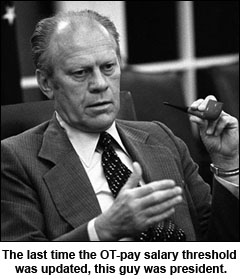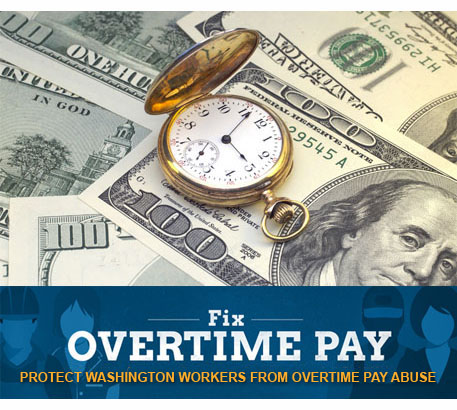OPINION
Salaried? It may cost you basic protections
Half a million workers stand to gain if Washington state updates an obscure administrative rule from the 1970s.
By MARILYN WATKINS
OLYMPIA (Oct. 30, 2018) — It’s been 42 years since Washington set the threshold at $250 per week, or $13,000 per year, that determines which salaried employees are exempt from the protections of minimum wage, sick leave, and overtime laws. That’s the equivalent of working about 22 hours a week at today’s minimum wage.
 Overtime, minimum wage, and sick leave laws ensure that employees receive reasonable compensation for their work and have sufficient time for family, health, recreation, and civic participation. Anyone paid an hourly wage of any amount automatically qualifies for 1.5 times their usual rate for any hours they work over 40 hours in a week. They also have the right to earn paid sick time and use it if they are sick, need to see the doctor, or have a sick family member.
Overtime, minimum wage, and sick leave laws ensure that employees receive reasonable compensation for their work and have sufficient time for family, health, recreation, and civic participation. Anyone paid an hourly wage of any amount automatically qualifies for 1.5 times their usual rate for any hours they work over 40 hours in a week. They also have the right to earn paid sick time and use it if they are sick, need to see the doctor, or have a sick family member.
But many salaried employees don’t get these protections.
In theory, people in “white collar” positions paid salaries above the threshold still qualify for these protections if their job duties don’t include a significant amount of discretion and decision-making. The state’s official explanation of how to determine if someone’s duties qualify as exempt is 26 pages long.
Quick show of hands – who out there who’s ever been paid a salary has read the job duties that define whether or not you’re actually exempt?
 When Congress first passed the Fair Labor Standards Act in 1938, it set a salary threshold for exemption from overtime protections at the equivalent of three times a 40-hour work week at minimum wage. The threshold remained at about that level for the next three decades. In 1975, 62.8% of salaried full-time workers in the U.S. made less than the federal exemption threshold and were therefore automatically eligible for overtime pay and other protections. By 2016, that percentage had fallen to 6.8%.
When Congress first passed the Fair Labor Standards Act in 1938, it set a salary threshold for exemption from overtime protections at the equivalent of three times a 40-hour work week at minimum wage. The threshold remained at about that level for the next three decades. In 1975, 62.8% of salaried full-time workers in the U.S. made less than the federal exemption threshold and were therefore automatically eligible for overtime pay and other protections. By 2016, that percentage had fallen to 6.8%.
Restoring the threshold to the historic level of three times Washington’s minimum wage would provide a livable salary for small families in moderately priced parts of the state, but remain insufficient to support a single parent with two children in King and Snohomish counties.
As overdue as an update to the salary rule is, a number of business lobby associations and some nonprofit employers, including the Boys and Girls Club, are opposing an increase to a livable-wage level. Raising the threshold does not require any employer in the state to raise salaries. It only requires employers to appropriately compensate lower- and middle-income workers for time worked in excess of 40 hours in a week and to provide access to paid sick and safe time without imposing penalties.
We live in a time when many struggle to achieve basic economic security and salaried employees are often expected to both work long hours and check email 24/7. It’s high time the state acted to ensure most workers have the right to a little extra compensation for long hours and the right to sometimes disconnect from work.
 Marilyn Watkins is Policy Director for the Economic Opportunity Institute. The EOI’s mission is to build an economy that works for everyone by advancing public policies that promote educational opportunity, good jobs, healthy families and workplaces, and a dignified retirement for all. (This column was originally posted at the EOI blog and is crossposted here with the author’s permission.)
Marilyn Watkins is Policy Director for the Economic Opportunity Institute. The EOI’s mission is to build an economy that works for everyone by advancing public policies that promote educational opportunity, good jobs, healthy families and workplaces, and a dignified retirement for all. (This column was originally posted at the EOI blog and is crossposted here with the author’s permission.)
For more information, check out the EOI’s new report, “Time Is Money, Unless You’re Salaried: Washington’s Minimum Wage, Sick Leave, and Overtime Laws Haven’t Been Updated in 40 Years.”
 ALSO at The Stand — State moves to restore overtime pay protections — After four decades of inaction, L&I releases “pre-draft” towards updated overtime rules that could restore protections to hundreds of thousands of salaried workers.
ALSO at The Stand — State moves to restore overtime pay protections — After four decades of inaction, L&I releases “pre-draft” towards updated overtime rules that could restore protections to hundreds of thousands of salaried workers.
TAKE A STAND — Click here to submit comments to L&I in support of raising the overtime pay exemption threshold to 2.5 to 3 times the state minimum wage. Feedback can also be submitted via email to EAPRules@Lni.wa.gov.





